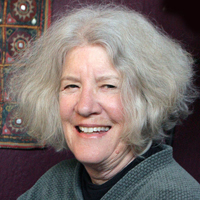My mother tells me she's lucky. I am always startled by these words because I think she has been extraordinarily unlucky.
Over 50 years ago, when she was 45, she sustained severe brain damage in a car accident, and has not lived independently since. She knows her name, but not where she lives or how old she is. She is unable to walk or speak clearly. Not lucky.
Yet she thinks otherwise. "Oh, boy," she'll say. "I am so lucky." When I ask what she means, she'll say, "I have you and Mike," my brother.
This doesn't seem like enough. How about the losses, I wonder -- not being able to walk or think or read or drive or work or take a bath or leave the house or fix a meal for someone she loves.
When she asks how I am, and I say I'm fine, she'll tell me I am very lucky. But I don't always feel lucky. There are days, for instance, when being with her is difficult. Again and again, she asks the same questions that someone without a memory needs the answers to. Where am I? Where do I live? Where are we going? Her questions are easy to answer. It's the repetition that's difficult.
